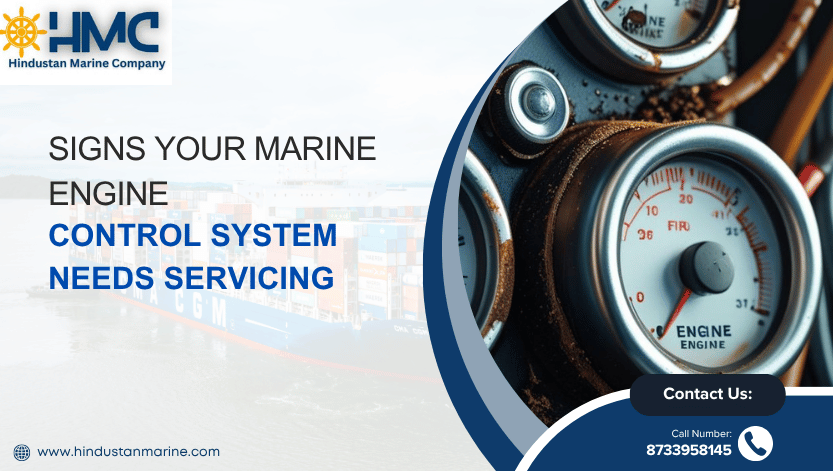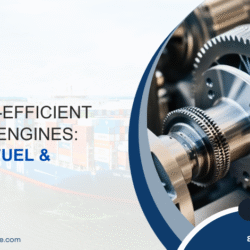
Signs Your Marine Engine Control System Needs Servicing
Introduction
When it comes to maintaining your boat or ship, the marine engine control system plays a pivotal role in keeping everything running smoothly. Often overlooked, this system is vital for regulating engine performance, fuel efficiency, and overall safety. Whether you’re a commercial vessel owner or a passionate boating enthusiast in India, understanding when your engine control system needs servicing can save you from major headaches down the line.
In this post, we’ll walk you through the signs your marine engine control system needs servicing, so you can take action before the issues turn into costly repairs. Trust us, timely maintenance not only boosts engine performance but also extends the life of your vessel. Let’s dive in!
What is a Marine Engine Control System?
Before identifying issues, it’s essential to understand what a marine engine control system is and how it works.
A marine engine control system is an integrated network that manages the engine’s performance, fuel usage, and exhaust systems. It includes several components such as the control panel, electrical sensors, fuel injectors, and power modules. This system helps ensure your engine operates efficiently and safely, adjusting parameters such as fuel flow, engine speed, and exhaust levels.
For most vessels in India, this system operates using a combination of analog and digital controls, designed to adjust in real-time based on your engine’s needs. It’s easy to take it for granted when everything’s running well, but any malfunction in the control system can affect the engine’s efficiency, and if ignored, can lead to breakdowns or even accidents.
Signs Your Marine Engine Control System Needs Servicing
1. Unusual Engine Behavior
If your marine engine starts acting strangely, it’s time to pay attention. Unusual engine behavior is often one of the first signs that something is wrong with your engine control system. This includes:
- Rough Idling: If your engine is having trouble maintaining a steady idle speed, it could be a sign of a malfunctioning control system.
- Stalling: If your engine keeps stalling unexpectedly, it’s likely due to an issue in the fuel or air supply regulation.
- Poor Acceleration: If your boat takes longer than usual to speed up or struggles to reach higher speeds, it could indicate a problem in the throttle system or engine sensors.
2. Warning Lights on the Dashboard
Modern marine engines are equipped with diagnostic systems that alert you to issues via warning lights on the dashboard. These alerts are like red flags indicating something needs attention.
- Engine Temperature Warning: If the engine temperature light turns on, it could mean your engine control system is failing to regulate cooling properly.
- Low Oil Pressure: This warning could be a sign of problems with the oil delivery system, which is monitored by your control system.
- Fuel System Issues: A fuel warning light may indicate issues with the fuel control sensors, preventing proper fuel flow.
3. Inconsistent Engine Speed
Inconsistent engine speed or irregular RPM (revolutions per minute) is another sign your marine engine control system may be on the fritz.
- RPM Fluctuations: If your engine speed fluctuates without any manual input, this could point to a faulty throttle or sensor.
- Unstable Throttle Response: A sluggish or unresponsive throttle can be caused by issues with the control system’s power supply or wiring.
4. Unexplained Engine Shutdowns
If your engine shuts off unexpectedly without any obvious cause, it’s a clear sign of malfunction. The marine engine control system might be losing connection to critical components, or a sensor might be failing to relay the right information.
- If you experience frequent stalling without any apparent reason, it’s best to consult a professional to avoid being stranded at sea.
5. Excessive Engine Noise or Vibration
Excessive engine noise or vibrations can be a sign of misalignment or mechanical failure in the control system.
- Unusual Noise: If your engine starts producing strange, grinding noises, there could be an issue with the control panel or the components connected to the engine.
- Vibrations: If your vessel starts to vibrate unexpectedly, it could indicate a fault in the control system that is preventing the engine from functioning properly.
Common Causes of Marine Engine Control System Failures
Now that we know the signs to look out for, let’s explore the common causes of marine engine control system failures.
- Electrical Problems: Marine engines are sensitive to electrical issues, including wiring problems, corrosion, and power surges. Electrical faults often lead to the failure of critical sensors or components within the control system.
- Sensor Malfunctions: Sensors are responsible for providing real-time data to your control system. If a sensor fails or provides inaccurate readings, your engine could behave erratically.
- Fuel System Problems: Problems with fuel delivery, such as clogged fuel filters or malfunctioning injectors, are commonly linked to control system failures.
- Mechanical Failures: Issues like worn-out parts or faulty components in the control panel could cause your system to fail.
The Importance of Regular Servicing and Diagnostics
Ignoring the marine engine control system can lead to bigger problems down the road. Regular servicing and diagnostics are essential for identifying issues before they turn into expensive repairs or cause permanent damage.
In India, especially for vessels operating in the coastal regions, harsh conditions like saltwater corrosion and extreme temperatures can accelerate wear and tear. Conducting regular checks not only extends your engine’s life but also ensures you’re operating at peak efficiency.
Professional diagnostic tools can provide a detailed picture of your system’s health, allowing you to catch small issues before they become major problems.
How to Service Your Marine Engine Control System
Servicing a marine engine control system requires knowledge of both the system’s components and the right tools. Here are some general steps for maintaining your system:
- Visual Inspection: Check the engine control panel, wires, and connections for signs of damage or corrosion.
- Sensor Checks: Test the sensors to ensure they’re providing accurate data to the control system.
- Electrical System Inspection: Examine the wiring for any signs of wear and replace damaged components.
- Fuel System Maintenance: Clean the fuel filters and check injectors for proper functioning.
- Software Updates: Some modern systems may require software updates to ensure they are running efficiently.
Always consult the manual for your specific engine or seek professional help when in doubt.
When to Call a Professional
While basic maintenance can be done on your own, some issues will require a professional marine technician. If you notice:
- Persistent warning lights
- Unstable engine performance
- Frequent engine shutdowns
It’s best to take your vessel to an expert who can diagnose the issue using advanced tools and provide a comprehensive fix. Marine engine technicians are trained to troubleshoot and repair complex systems, ensuring your vessel stays in top shape.
Conclusion
Your marine engine control system is the heart of your vessel’s performance. Keeping an eye out for signs that it needs servicing will not only help you avoid costly repairs but also ensure that you get the most out of your engine.
Timely maintenance and servicing are key to keeping your engine running smoothly and extending its lifespan. If you notice any of the signs mentioned above, don’t wait for the problem to worsen. Act quickly to ensure your vessel remains in perfect condition for the next voyage.

